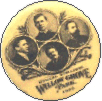|
John Philip Sousa
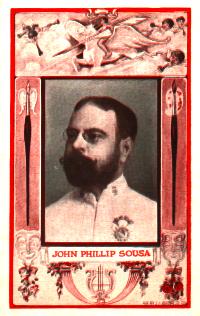 The March King : The Uniqueness of Sousa:
The March King : The Uniqueness of Sousa:
John Bourgeois, the former conductor of the U. S. Marine Band, said of Sousa:
 "First, Sousa stood for integrity. He stood for the highest standards in music and had been educated in theory, composition and violin from the time he was a child. Like Mozart, Sousa could virtually pluck sound from mid-air and record it perfectly. Yet even with this great talent, he was also a scholar who never lost his desire to learn and to expand his knowledge. His integrity was founded in the highest musical standards, and he was a complete musician in every way. "First, Sousa stood for integrity. He stood for the highest standards in music and had been educated in theory, composition and violin from the time he was a child. Like Mozart, Sousa could virtually pluck sound from mid-air and record it perfectly. Yet even with this great talent, he was also a scholar who never lost his desire to learn and to expand his knowledge. His integrity was founded in the highest musical standards, and he was a complete musician in every way.
 Second, Sousa was an innovator. We don't often think of him as such - until we look at him within the context of his own era. When Sousa took over leadership of the Marine Band in 1880, his first act was to change the band's repertoire, displacing mediocrity with the finest music available from Europe. He wanted new music, substantial music for his band. He wanted the best music by the best composers of the day as well as the past. He was a champion of new music by composers like Verdi, Tchaikovsky and Dvorak. A study of Sousa's concert programs will reveal works by these composers listed as "new compositions" as controversial in their day as avant-garde offerings are today." ( from BANDWAGON MAY-JULY 1995) Second, Sousa was an innovator. We don't often think of him as such - until we look at him within the context of his own era. When Sousa took over leadership of the Marine Band in 1880, his first act was to change the band's repertoire, displacing mediocrity with the finest music available from Europe. He wanted new music, substantial music for his band. He wanted the best music by the best composers of the day as well as the past. He was a champion of new music by composers like Verdi, Tchaikovsky and Dvorak. A study of Sousa's concert programs will reveal works by these composers listed as "new compositions" as controversial in their day as avant-garde offerings are today." ( from BANDWAGON MAY-JULY 1995)
A Brief Biographical Sketch
From the park’s promotional material:
 "As
the first ten children, he began life at the head of the parade
(in 1854). His father, Antonio, was a Portuguese immigrant, who
later played trombone in the U. S. Marine Band. Home in
Washington, D. C. was an exciting place to be in that Civil War
time: Patriotic feelings ran high - and march music was heard
everywhere. It stirred the young boy’s soul. "As
the first ten children, he began life at the head of the parade
(in 1854). His father, Antonio, was a Portuguese immigrant, who
later played trombone in the U. S. Marine Band. Home in
Washington, D. C. was an exciting place to be in that Civil War
time: Patriotic feelings ran high - and march music was heard
everywhere. It stirred the young boy’s soul.
 At the age of ten, he
was a promising violinist and at thirteen formed his own
Quadrille Band and began attracting attention as a violinist. But
like many young boys, he decided to run off to join the circus.
His parents found out, however, and he was abruptly whisked off
for an enlistment in the Marine Corps, as an apprentice in the
band." At the age of ten, he
was a promising violinist and at thirteen formed his own
Quadrille Band and began attracting attention as a violinist. But
like many young boys, he decided to run off to join the circus.
His parents found out, however, and he was abruptly whisked off
for an enlistment in the Marine Corps, as an apprentice in the
band." 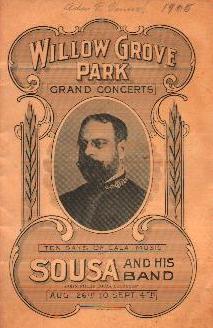
 In 1876 he became one
of the first violinists in the orchestra conducted by Offenbach
(in Philadelphia at the Centennial Exposition) and later married
a Philadelphia girl, Jeanie Bellis, in 1879. In 1876 he became one
of the first violinists in the orchestra conducted by Offenbach
(in Philadelphia at the Centennial Exposition) and later married
a Philadelphia girl, Jeanie Bellis, in 1879.
 He became head of the
U. S. Marine Band in 1880; and served in that capacity under
Presidents Hayes, Garfield, Arthur, Cleveland and Harrison. He became head of the
U. S. Marine Band in 1880; and served in that capacity under
Presidents Hayes, Garfield, Arthur, Cleveland and Harrison.
 On July 29, 1892
President Benjamin Harrison presented Sousa with a gold baton,
appropriately inscribed, for this service as leader of the Marine
Band , and for his march, "Semper Fidelis" (always
faithful), which had become the Corps’ official song.
Shortly thereafter Master Sergeant Sousa resigned from the Marine
Corps. and formed his own concert band. On July 29, 1892
President Benjamin Harrison presented Sousa with a gold baton,
appropriately inscribed, for this service as leader of the Marine
Band , and for his march, "Semper Fidelis" (always
faithful), which had become the Corps’ official song.
Shortly thereafter Master Sergeant Sousa resigned from the Marine
Corps. and formed his own concert band.
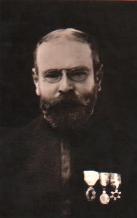  In 1892,
after the death of Patrick S.Gilmore that same year, (leader of
the country’s first successful concert band), nineteen of
the that band’s members joined Sousa. These men became the
nucleus of Sousa’s own great band... In 1892,
after the death of Patrick S.Gilmore that same year, (leader of
the country’s first successful concert band), nineteen of
the that band’s members joined Sousa. These men became the
nucleus of Sousa’s own great band...
 In 1897, aboard ship,
returning home from Europe he composed the music and words to his
most famous single work: The Stars and Stripes Forever." In 1897, aboard ship,
returning home from Europe he composed the music and words to his
most famous single work: The Stars and Stripes Forever."
 Paul Bierley, in his
biography John Philip Sousa, American Phenomenon writes
extensively about Sousa’s involvement at Willow Grove and
explains how Sousa (at age sixty-two) enlisted in the U. S. Naval
Reserve Force to train young bandsmen at the Great Lakes Naval
Training Center during World War I. However, he was granted leave
during the summer months of 1917 and 1918 to fulfill engagements
of the Sousa Band. He twice declined promotions, but was promoted
to lieutenant commander after his release from active duty. He
wore this uniform in the 1920’s. Bierley’s books
provide the most in-depth research into Sousa and his works. Paul Bierley, in his
biography John Philip Sousa, American Phenomenon writes
extensively about Sousa’s involvement at Willow Grove and
explains how Sousa (at age sixty-two) enlisted in the U. S. Naval
Reserve Force to train young bandsmen at the Great Lakes Naval
Training Center during World War I. However, he was granted leave
during the summer months of 1917 and 1918 to fulfill engagements
of the Sousa Band. He twice declined promotions, but was promoted
to lieutenant commander after his release from active duty. He
wore this uniform in the 1920’s. Bierley’s books
provide the most in-depth research into Sousa and his works.
 John Philip Sousa and
his band played at Willow Grove park from 1901 to 1926, except
for the year 1911, when the band was on a world tour. His last
performance at WILLOW GROVE was in 1926 at a special 25th
Anniversary engagement. John Philip Sousa and
his band played at Willow Grove park from 1901 to 1926, except
for the year 1911, when the band was on a world tour. His last
performance at WILLOW GROVE was in 1926 at a special 25th
Anniversary engagement.
 He continued to tour
the country with his band. He and Victor Herbert also helped to
found (ASCAP) to help copyright protection. On May 6, 1932, while
in Reading (PA) to guest conduct the Ringhold Band, he died after
rehearsal. He continued to tour
the country with his band. He and Victor Herbert also helped to
found (ASCAP) to help copyright protection. On May 6, 1932, while
in Reading (PA) to guest conduct the Ringhold Band, he died after
rehearsal. 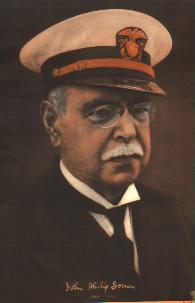
Information from:
Abington Township Activities Calendar 1977.
John Philip Sousa, American Phenomenon by Paul Bierley
The Works of John Philip Sousa by Paul Bierley
Willow Grove Park, Philadelphia’s Fairyland (1909) by Leigh
Mitchell Hodges
Willow Grove Park, A Look Back in Time to Another Era of
Entertainment by Ray Thompson
Learn More...
Return to Performers
|
